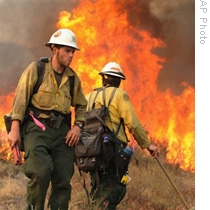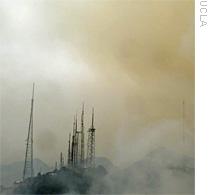02 September 2009
 |
| Firefighters monitor a fire in the suburb of Glendale on the outskirts of Los Angeles, California, 01 Sep 2009 |
Logan and her colleagues are investigating the consequences of climate change on wildfires, and the impact on U.S. air quality. She says their research indicates the warming of the earth's atmosphere "definitely" is linked to a longer summer and shorter winter, which results in less snow and ice run off.
Hot Weather, Dry Vegetation
Wild fires tend to get more severe when the weather is very hot, and very dry for a long time where fuels can age. So far this year, more than 68,000 wildfires have burned about 2.2 million hectares of U.S. land, which is not far off from the 10-year average (between 1999 and 2008) of about 2.3 million hectares burned annually, according to the National Interagency Fire Center.
As the climate warms in the coming decades, however, Logan and her team of atmospheric scientists at Harvard's School of Engineering and Applied Sciences (SEAS) expect that the frequency of wildfires will increase in many regions. Their research, published in the Journal of Geophysical Research, suggests that the area of forest burnt by wildfires in the United States will increase by more than 50 percent by 2050. Temperature was the primary factor impacting the wildfire surge, though dry vegetation also played a role.
Increased Wildfires and Increased Pollution
Tropical forests may be particularly affected by soaring greenhouse gas emissions, noted
 |
| A webcam image of the Mount Wilson observatory near Los Angeles shrouded in smoke, 01 Sep 2009 |
The Harvard study also represents the first attempt to quantify the impact of future wildfires on the air we breathe. Its findings are ominous. "Because smoke and other particles from fires adversely affect air quality, an increase in wildfires could have large impacts on human health," said Logan.
The researchers predict that an increase of more than 50 percent in the burn area in the western United States by 2050 would result in a near doubling of carbon-based aerosols into the atmosphere and "important consequences" for western U.S. air quality and visibility.